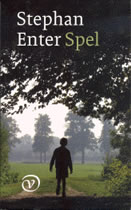Stephan Enter
Game (Spel)
Creating maximum effect with minimal means
Stephan Enter is a writer who takes time to describe the atmosphere, milieu and nature of his characters sensitively and in great detail. As with his previous two novels, this new one is characterised not by loud street noises or an exciting urban life of drink, drugs and rock & roll, but by a refined, touching, sometimes happy, sometimes sad atmosphere in which he describes a number of scenes from the childhood of an intelligent village boy.
Norbert Vijgh is shy and self-conscious, wary and sensitive, perhaps over-sensitive, to everything happening around him. Norbert is a familiar type in Dutch literature: Stephan Enter belongs to the same clear, realistic tradition of writers like Vestdijk, Reve and Rosenboom.
Norbert Vijgh’s youth is unexceptional; he grows up from boy to teenager to young man in a life marked by nothing more than ripples. But still waters can run deep and dark. The real world intrudes constantly into Norbert’s safe inner world dominated as it is by reveries and fantasy. In the first chapter, Bird Language, Norbert plays ‘Indians’ in the woods near his native village and for the first time in his life meets a black man. To his excitement and surprise, they become friends. Sadly ‘Soufi-Ali’ leaves the village and the friendship ends.
This ennobling pattern recurs in every chapter, each of which is a well-plotted short story in its own right, and in each of which a game is played. In effect, Norbert is forced to play a game with the world outside; he plays in earnest but doesn’t always ‘win’. Becoming aware of adult reality often means losing the naïve or audacious boy-thoughts that he loves. ‘Perhaps this is when, now that you’re eighteen, the days of fantasy bouncing all over the place are over, transformed into a lead bullet that’ll barely roll forwards,’ Norbert thinks.
On the threshold of adulthood, addressed by figures in the stained-glass windows in church, Norbert falls from his father’s faith, falls in love and, for the first time, makes love to a girl. To his horror, he sees pimples appear on his schoolfriends’ faces, he is humiliated by a group of gangling youths and travels abroad by train for the first time – all crucial initiation rites.
In the last chapter, ‘Scrabble’, in which Norbert goes on holiday in Switzerland with his grandmother, Enter once again makes it clear what this book is about, creating maximum effect with minimal means. By painting an affectionate portrait of the frail ‘grandma’ – seemingly unexceptional material – through the eyes of her nearly grown-up, loving grandson, he impresses and moves the reader. Stephan Enter knows how to play the game, poignantly and subtly.
Publisher
G.A. van Oorschot
Herengracht 613
NL - 1017 CE Amsterdam
TEL. +31 20 623 14 84
FAX +31 20 625 40 83
E-mail: [email protected]
Website: www.vanoorschot.nl
Publishing details
Spel (2007, 269 pp)

Biography
Stephan Enter’s debut, a collection of short stories entitled Winterhanden (Chilblained Hands), published in 1999, was received well and was nominated for the Libris Literature Prize 2000. His first novel, Lichtjaren (Light Years), published in 2004, was also nominated for the Libris Prize. Both books were nominated for the Gerard Walschap Prize. Enter’s second novel, Spel (Game), appeared in 2007.
Quotes
Spel [Game] is beautiful, tender, impressive. Stephan Enter evokes a childhood doomed to disappear, but continuing to exist in a natural, gradual, increasingly poignant way.
Jan Siebelink
Enter has composed the eleven chapters of his novel in such a way that each forms a masterfully complete story. […] Enter manages to use language as a key to to a different reality.
Het Parool
In his case, commitment translates as the desire to demonstrate relationships between people as precisely as possible in evocative and extremely beautiful writing.
De Groene Amsterdammer
Stephan Enter’s new novel touches upon a fundamental theme in literature: where do we find something to hold on to in life and where do we dare to live without it?
NRC Handelsblad
